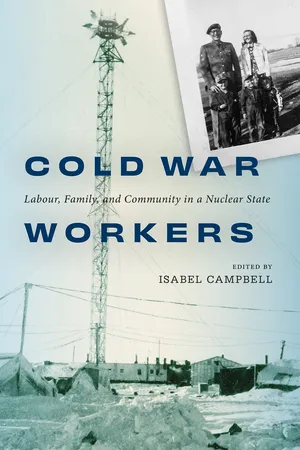
- 336 pages
- English
- ePUB (mobile friendly)
- Available on iOS & Android
About this book
When Canada sought to protect its borders and aid its allies during the Cold War, many people were recruited to build the emerging security state: as construction and maintenance workers, engineers, members of the armed forces, medical researchers, and research subjects. Security work transformed the lives of individuals, families, and communities in ways that were both predictable and surprising, and both beneficial and harmful; the militarization and colonization of Indigenous lives and lands was especially disruptive.
The opening essays of Cold War Workers intimately portray the complicated effects of Cold War labour upon Indigenous lives. Elmer Sinclair, a residential school survivor and member of the Canadian Armed Forces, achieved equality with white men through his militarized masculinity. His more positive professional experience contrasts with those of Indigenous workers on northern radar lines, many of whom lost languages, connections to the land, and other elements of traditional cultures as they sought new skills and better employment. Diverse Indigenous experiences of Cold War security work set the scene for the second set of essays, which explore the impact of security preoccupations on marginalized groups – the study of extreme isolation through scientific experimentation on human subjects; the targeting of gay men with psychiatric labelling to enforce an idealized masculinity; and the restriction of gender mobility in the Canadian military, and the pushback from servicewomen.
Cold War Workers raises questions about the influence of settler-colonial masculine institutional values on those who laboured for the Cold War state and society. By comparing the experiences of different types of workers, families, and communities, this volume reveals how race, gender, and privilege affected people in varied and sometimes unexpected ways.
Frequently asked questions
- Essential is ideal for learners and professionals who enjoy exploring a wide range of subjects. Access the Essential Library with 800,000+ trusted titles and best-sellers across business, personal growth, and the humanities. Includes unlimited reading time and Standard Read Aloud voice.
- Complete: Perfect for advanced learners and researchers needing full, unrestricted access. Unlock 1.4M+ books across hundreds of subjects, including academic and specialized titles. The Complete Plan also includes advanced features like Premium Read Aloud and Research Assistant.
Please note we cannot support devices running on iOS 13 and Android 7 or earlier. Learn more about using the app.
Information
Table of contents
- Cover Page
- Title Page
- Copyright
- Contents
- Figures
- Acknowledgments
- Abbreviations
- Introduction: Early Cold War Transformations in Labour, Family, and Communities
- 1 A Tale of Two Worlds – One an Open Book, the Other a Dark Secret: The Life Experiences of Elmer Sinclair in the Fort Alexander Indian Residential School and in the Canadian Army
- 2 “We Are Willing to Stand on our Own Two Feet,” Cold War Moosonee: Adaptation to Change and to Closure of a Radar Station
- 3 Voices from the DEW Line
- 4 Overcoming Monotony: Sensory Deprivation and Psychological Research in the Cold War
- 5 “The Most Common Deviation”: The Problem of Pathologizing “Homosexuality” and the Fear of Masculine Weakness at the Toronto Forensic Clinic
- 6 Constructing the Military Career Woman, 1950s–60s
- Conclusion: The Early Cold War and the Sounds of Silence
- Contributors
- Index